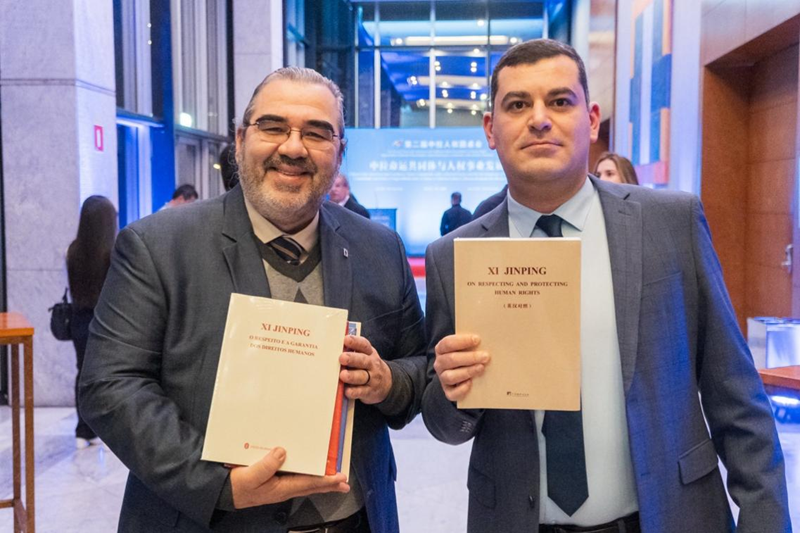A Table Reclaimed

If the global human rights architecture is to endure, it must open space for many forms of progress and many paths to justice.
In the grand halls where international human rights have long been debated, some voices have spoken loudly while others are rarely heard at all. For much of modern history, the script has been familiar. A handful of powerful nations wrote the rules, and the others were expected to follow them. But on July 25, in São Paulo, Brazil, a change took place on a global scale. The Second China-Latin American and Caribbean States Roundtable on Human Rights was not just another forum to discuss the rules; it brought about a shift in their authorship.
Representatives from across Latin America, the Caribbean and China gathered not to request a place in a predefined narrative, but to propose a new one. At the roundtable, 20 nations came together not as guests but as coauthors of a document that signals a quiet but determined realignment.
The São Paulo Consensus was carefully negotiated and diplomatically worded, but it is at once a critique and a vision. It is a response to the selective moralism of global politics and an invitation to reshape human rights discourse on fairer and firmer ground.
The pushback against instrumentalization
One of the roundtable’s most resonant themes was a shared frustration with the selective application of human rights by certain powerful states. While the consensus refrained from naming specific countries, the critique was pointed. From sanctions justified as moral imperatives to interventions framed as humanitarian concern, the participants recognized a pattern in which human rights have become diplomatic tools to pressure, isolate or punish rather than to protect.
Professor Zhang Donggang, Chair of the University Council at Renmin University of China, spoke candidly about the politicization of rights discourse. “Some Western countries are still accustomed to politicizing and even instrumentalizing human rights,” he said. “Under the pretext of promoting civilization or protecting human rights, they grossly interfere in the internal affairs of other nations, causing social disorder where rights and development become luxuries.”
Latin American and Caribbean voices echoed these concerns, including Arley Gill, Chairman of the National Reparations Committee of Grenada, who connected today’s global imbalances to colonial legacies and urged the international community to move toward justice, not just acknowledgement. “Colonial powers became rich through extraction,” he said. “We were left poor. Now, let us begin the process of repairing the damage done to indigenous peoples and the descendants of enslaved Africans.”
In a world shaped by unequal histories, the right to define one’s own development path is not simply a matter of policy. It is a form of justice. The consensus gives voice to this reality. It affirms that the cause of human rights cannot be separated from the legacies of colonialism, underdevelopment and foreign interference.

Universality without uniformity
Central to the consensus is a key principle. Human rights are indeed universal, but their realization must respect national context. History, culture and development stage are not excuses for inaction, but foundations for locally grounded action. The assumption that all countries must follow a single model of governance or social structure in order to be considered legitimate is rejected here, firmly and without apology.
This does not mean lowering standards. It means broadening the lens. Social rights and political rights are not opposing forces but complementary ones. Civil liberties gain meaning only when anchored in economic dignity. Political participation becomes truly empowering when coupled with access to education, health and housing. The consensus recognizes this integration and calls for equal emphasis on all categories of rights.
For China, this is familiar ground. Its approach to rights has long focused on poverty eradication, education, employment and development as preconditions for lasting freedoms. What was significant in São Paulo was how clearly these ideas found resonance among Latin American and Caribbean partners. The message is clear. Dignity does not require imitation. It requires autonomy.
The ethics of progress
The consensus also reflects the changing nature of global challenges. As the world navigates the digital age and the climate crisis, the document points to new frontiers where rights must be defended and new risks where inequality threatens to deepen.
In digital governance, the emphasis is on inclusion. Access to technology, digital literacy and ethical standards for AI are not luxuries but necessities. The unchecked consolidation of technological power in the hands of a few corporations or states risks creating a new global divide. The consensus calls for international cooperation to ensure that technology serves the many, not the few.
On climate, the message is equally urgent. Environmental degradation is already threatening lives and livelihoods, particularly in vulnerable communities. The document affirms that an ecologically balanced environment is essential to the full enjoyment of human rights. At the same time, it defends the right of developing countries to pursue economic growth on their own terms. It insists that green transition must be fair, inclusive and adapted to local capacity.

Multilateralism that matters
The consensus does not reject global governance. It calls for its renewal. In a time of rising unilateralism and fragmented diplomacy, the document affirms support for the United Nations system, especially the Human Rights Council, while calling for reforms to ensure impartiality, balance and genuine inclusivity.
Multilateralism, in this vision, is not about reinforcing existing hierarchies. It is about creating space for shared leadership. The consensus invites the countries of the Global South to take a more active role in shaping international norms. It champions a world where no state, regardless of power or wealth, has the right to speak over others.
This spirit of cooperation has already taken institutional form. The announcement of the China-Latin American and Caribbean States Human Rights Research and Cooperation Network signals a commitment to long-term engagement. Through academic exchanges, joint research and shared platforms, the network aims to deepen understanding and expand the space for dialogue on rights, development and global governance between nations of the Global South.
Returning to the table
In São Paulo, no resolutions were imposed and no single ideology prevailed. What emerged instead was the beginning of a shared framework. One that recognizes history without being trapped by it. One that acknowledges difference without fearing it. One that reclaims the conversation on rights, not as a battleground of ideologies, but as a space for dignity, peace and mutual respect.
The table at the roundtable was simple in design but profound in meaning. Around it sat not petitioners but participants. Not imitators but innovators. The image of that table lingers because it marks a quiet turning point. A moment when nations once spoken over began to speak back. Not in defiance, but in determination.
If the global human rights architecture is to endure, it must open space for many forms of progress and many paths to justice. The São Paulo Consensus reminds us that human dignity is not bestowed by power. It is built patiently, collaboratively and on equal ground.
And that kind of dignity always begins at the table. Not one granted. One reclaimed.
The author is a Brazilian scholar of international relations.
 Facebook
Facebook
 Twitter
Twitter
 Linkedin
Linkedin
 Google +
Google +










